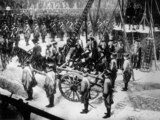Berthold Viertel’s film Little Friend (GB 1934)
Berthold Viertel’s film Little Friend (GB 1934)
Je lyrischer, je psychologischer ein Manuskript ist, umso mehr spricht es mich als mögliches Drehbuch an.
[The more poetic, the more psychological a manuscript is, the more it appeals to me as a potential film script. (ed. trans.)]
Berthold Viertel in an interview talking about Little Friend (Britain 1934)
Following the Reichstag Fire at the end of February 1933, theatre and film director Berthold Viertel fled via Prague to London. He was contracted there in 1934 by the Gaumont British Picture Corporation, which had just filmed the elaborate costume drama Jew Süss with another well-known Jewish refugee, the actor Conrad Veidt. At Viertel’s suggestion, the Ernst Lothar novel Little Friend was adapted for film. The production company employed a large number of German-speaking exiles to make the film, for example, camera man Günther Krampf and props specialist Alfred Junge, with the music being composed by Ernst Toch.
Viertel’s experiences with the US film industry at the end of the 1920s had depressed him, as it was too much about the money and not enough about the art. He was now highly motivated about his first engagement as a film director in England.
Little Friend tells the story of a failed marriage through the eyes of the twelve-year-old daughter of the couple. The sensitive girl is shocked when she learns that people she loves tell lies and are deceitful. “This is certainly one of the best of the British photoplays”, wrote the New York Times Film Review. The contractor was also happy and concluded an agreement for another three films with Viertel. However, only two were actually made: Gaumont British got into financial difficulty and when Viertel’s work permit wasn’t extended in 1939, he left Britain heading for the USA.


